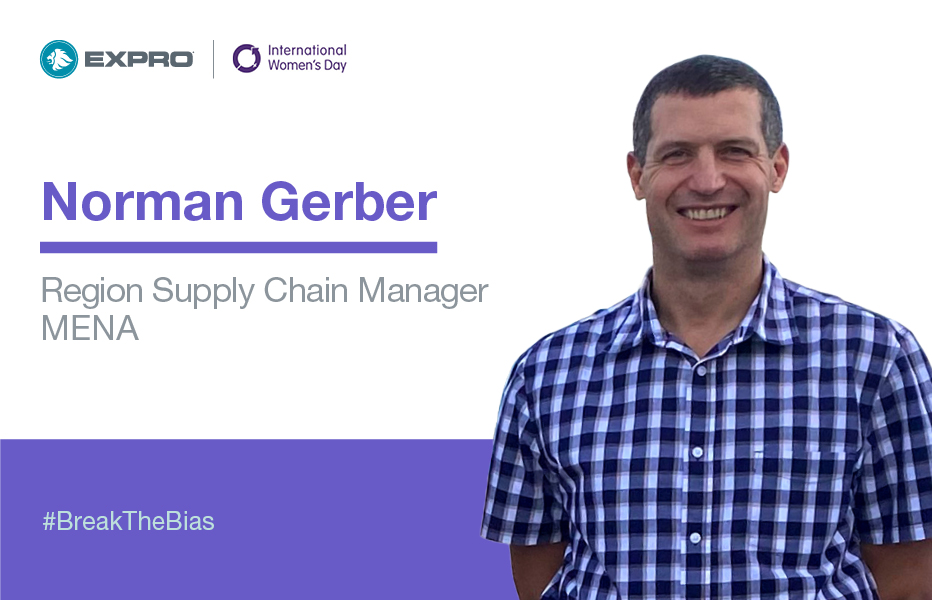- Home
- Products & services
- Well Construction
- Well Flow Management
- Subsea Well Access
- Subsea Test Tree Assemblies
- Intervention Riser System
- Riserless Well Intervention System
- PRT Offshore
- Motion Compensated Coiled Tubing Lift Frame
- Inline Compensator 600T
- Inline Compensator 220T
- ProFrame™ Coiled Tubing Lift Frame
- HOSS™ Wireline Lift Frame
- Gate Valve Flowhead
- Surface Test Tree
- Quick Union
- Lubricator Valve
- Subsea Landing String
- Subsea Controls
- ProComp™ Tower
- Intervention Work Tower
- Blue Sky Tower
- Accessories & Rental Tools
- Contact Us
- Well Intervention and Integrity
- Coretrax
- Sustainable Energy Solutions
- Case studies
- Media hub
- Careers
- Citizen of the world
- Contact
- Our 2023 Sustainability Review
- About Us
- Investors
- Locations
International Women’s Day - Norman’s story

Norman has worked with Expro for over 14 years and is a strong advocate for equality in the workplace. He believes if you are the right person for the job, you should be doing the job.
Why do you think diversity is so important in the workplace?
We stagnate if we have the same outlook on life, work, and the general world. Teams are not made up of individuals but of groups of people. In my view, the more diverse the group, the more innovation and positive growth occur. Suppose companies employ a diverse workforce consisting of people of different ages, genders, ethnicities, cultural backgrounds, education levels, and experience. In that case, they tend to grow in productivity and work satisfaction and general employee wellness because everyone then feels as if they matter and as if they are making a difference.
A team with a diverse worldview and different perspectives can educate employees and clients alike, and that team can even reach untapped client bases. By diversifying, not only on products or services offerings but also our people, we can reach a far bigger audience out there, which will equal not only success for our companies but also more growth and a feeling of belonging for all its employees. This can be a game-changer for Expro on the international field.
What makes equality that bit more important to you than it might seem to others?
I have seen firsthand how men and women were treated differently, based solely on their gender. When I was growing up in South Africa, it was the generally accepted societal norm that men went out to work every day and were the only breadwinners in the household. Women were generally expected to get married, have children, raise the children, tend to the home, and make sure that the family unit was happy.
My Mom was an exception to the rule, and she was one of the very few women who worked every day.
I grew up knowing that both men and women deserve to get an education, get a job, and contribute to their home environment and the economy and society as a whole. Women might not be physically as strong as men (it's a physiological fact), but they are mentally and emotionally superior to most men I know, including me. They are versatile and able to juggle all aspects of their lives without letting the ball drop on any of those aspects. They are resilient, industrious, resourceful, capable and most of the time, have to work way harder than their male counterparts just to get some form of recognition or even just to be taken seriously in their jobs daily.
What can you, as a man, do to support women in your workplace?
Suppose inclusivity does not become a company or society's culture. In that case, we will be having these conferences, brainstorming sessions, and events well into the next century without actually addressing this at its core.
We need to create an environment and be given the tools to identify our individual and collective biases. Distinguish between positive and negative biases and address those negative biases that we identify to break the bias that is holding us back from being as efficient as our talent within our company will allow us to be. We need to differentiate between equality (numbers) and inclusivity (talent) and determine what inclusivity means.
We need to learn to be curious, not judgmental. Only by doing this will we ever be able to identify and be aware of inequalities within companies and society and actually break the bias that is preventing us from achieving our highest and most efficient self. And we can only do that through inclusivity.
What do you currently do, or hope to do, to break the bias?
We are all wired differently.
My upbringing, experiences, neural paths, and behavior are different from the persons next to me. We were raised in and live in a society where, as studies have shown, subconsciously, men are generally seen as the workforce, and women are seen as the care providers at home with families. And even if women are working, they are still expected to be the main caregivers at home. And so, the bias continues. We usually connect a negative emotion to the word bias. When in fact, bias is basically just our brains' way of simplifying decision making for us.
We must become acutely aware of our own biases and behaviors, both positive and negative, and be brave and willing enough to speak up both for ourselves (men and women), and for those who feel they cannot get out of fear of being labeled, once again.
Related articles
Find detailed information about our products and services.
